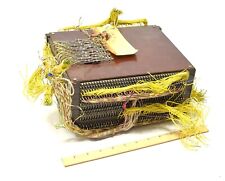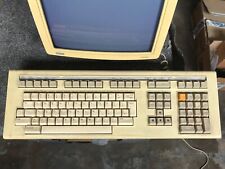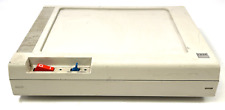-
my 2 Cents
for what my tired self can muster up on this topic here are my thoughs:
1.) Some insight on what I run and maintain.
a.) Day job = PC repair tech / Network Admin / Onsite Guy for small computer dealer.
b.) Windows and Linux User/Admin alike.
c.) Run a hybrid network at home, 12 machines total, almost a 50/50 split windows / linux. 1 web server / file server is debian. 1 mail server / A/V server is Windows Server 2003. workstations are mostly windows with linux test machines and workstations that dual-boot.
d.) Knoppix user since late 2002. Gave FabianX (Fabian Franz) original idea for f-prot auto-installer script that has been in knoppix since 3.4 I think. Is definately in 3.6.
2.) Windows angle:
a.) Windows is buggy by nature because the exact people that are charged with maintaining it are powerless to fix it directly when its crunch time.
b.) Windows always has a certain set of software loaded on it in every installation regardless of version (i.e. Internet explorer, Outlook Express, (lately MSN messenger)).
c.) Almost every version of windows maintains some link to previously used code that has since been obsoleted or found to be insecure.. (i.e. Netbios, IPX/SPX, etc.) It is also sometimes very difficult to remove offending outdated "bindings" under most versions of windows.
d.) (complete opinion) Microsoft has something to gain by having a consistant turnout of bugfixes. (Almost guarenteed support calls, OS upgrades, and maintenance contracts) each of which they make money on.
e.) Being as how they have their 75-95% market share for home users. they happen to have one of the most vulnerable markets for virus writers to prey upon. The clueless computer illetate society or the completely powerless to stop it (i.e. the ppl that know how to debug software can't because its closed source.)
f.) On windows people dont know what is normal and what is not. Everything can be spoofed in the exact manner in which Microsoft hides things from the end user. This includes running tasks that dont show up in taskman (when you press ctrl-alt-del). Your current temporary internet files folder (you can only accress it through the command prompt). your perminant I.E. URL history list. (only accessible through another os) (on a second note... what good is that file anyways?) Too many things are hidden from the people that need to know. Administrator is just as powerless as the user because the user is set to run as Administrator. That may seem a little confusing. But windows has evolved from a single user OS to a many single user OS... Admins get sick of dealing with permission denied errors so they say screw it and assign the user to the administrator group. etc... (this isn't strictly microsofts problem but...) This makes it very easy for viruses to get away with things... someone sees TaskMan.exe in their taskmanager list they dont think anything of it. little do they know that the real name of the program is @#Fksmd.com or something and was just changed to look legit ( i guess this could be possible under linux). Nor does the user have any method of checking to be sure.
2.) Linux angle:
a.) Not a large portion of the population is using linux. Which makes linux a smaller target for virus writers. Also the populace using linux generally either has an interest in their computers or has a network admin who does. This helps to mitigate the "stupid user" syndrome.
b.) Every install of linux is different. you might use elm to read e-mail while you might use thunderbird while someone else might use another app... my kernel is a different kernel than your kernel. my web browser is different than your browser. since there is no guarenteed application on each and every install... it makes a much less appealing target than the fairly stationary IE, OE, Windows Explorer, MSN messenger, Media Player, etc... since for almost every exploit you must know two things. the program you are breaking, and the location in RAM of the program that you want to run. (this is very setup specific so you need machines that are as similar as possible for you to successfully guess it)
c.)Code for Linux and GNU or open source apps can be edited by the owner, read by the owner, etc.... For example we have bob and tom. bob uses Windows XP, tom uses Debian. Someone found a critical bug in windows and a bug in linux. Both now have a virus waiting to be released into the wild. Someone hears about these viruses and e-mails microsoft and the Debian maintainers. The Debian maintainer in charge of the piece of code in question looks over his packages and hunts down the suspect code in question... edits it... and releases it. 3 hours later the patch is available to most every user by simply typing apt-get update folllowed by apt-get upgrade. turn time <24 hours for critical bugs. now Microsoft on the other hand.. adds thsi new bug report on top of the pile of bug reports to be filed... and maybe 1-2 weeks to 3-4 months from now will realease a "patch" that "fixes" this problem... by now there has been a virus released into the wild that is rampaging through all these users machines... most of which dont know, dont care, or cant even figure out where the power button even is. Many linux security bugs get squashed by attentive community code readers while they are still in "Conceptual bug" phase instead of realized and exploited bug phase.
d.) there is real system level user privelidge differences between the normal user and the root user. if a user clicks on a file that says rm -Rf /* (the administrators worst typo) the most they can do damage wise is to simply delete the files that they have been assigned permissions to... no on a windows machine a siimilar command can be run that basically removes all non running files from the computer... and the user wouldnt know until next reboot or application change.
e. the programs that you are breaking (for a virus to work) have to have a level of priveledges you want to gain. i.e. root or administrator rights. if the users programs are running as that user. you can break it all you want and still be stuck with only that users priviledges.
f. Linux is vulnerable to viruses, exploits, stupid users, spyware, misconfiguration, negligence, stupidity, oversight, etc. but the real difference is how much of that you can avoid using common sense. with windows you can get stuck right in the rear wether or not you were doing all of your updates and virus scans or not... on the other hand if you pay the same amount of attention to a linux machine... suddenly your sertup is so much more secure and since your machine is different from the next. theres no magical combination to your computer.
If all bank safes were made the exact same way.... would you feel safe having your money in it? what happens when you find a way to crack one of them? suddenly you have them all !!! I would rather have a diverse computer universe... iI feel like a nice small target and i like that...
yes linux can be broken... no its not as easy, untraceable, or convenient as windows but it can be done. should you worry about your linux install? no. you will know if it ever becomes a problem. if you need to know just ask someone in the community ^^ enough ranting though... time for bed -burnt-toast
Similar Threads
-
By crion in forum General Support
Replies: 0
Last Post: 11-26-2004, 01:49 AM
-
By styven in forum General Support
Replies: 3
Last Post: 11-10-2004, 06:01 PM
-
By jhobo4 in forum General Support
Replies: 3
Last Post: 03-19-2004, 04:10 AM
-
By M@rijn in forum Hdd Install / Debian / Apt
Replies: 0
Last Post: 07-03-2003, 09:45 AM
-
Replies: 26
Last Post: 07-01-2003, 09:18 PM
 Posting Permissions
Posting Permissions
- You may not post new threads
- You may not post replies
- You may not post attachments
- You may not edit your posts
-
Forum Rules


Macintosh Classic Model M-1420, For Parts Not Working. See Pics.
$45.00

Vintage IBM 4341 / 4361 / 4381 MCM Processor Mainframe CPU
$120.00

2x Various Brands 10.5" Mainframe 9-Track Reel Computer Data Tape 6250 CPI .5"
$7.99

Data General Nova Computer Vintage (SR41)
$4999.99

IBM Mainframe Core Memory, 1959
$2250.00

1960's Vintage GE-600 Series Mainframe Computer PCB Bitslice Accumulator Board
$10.95

10 Vintage Mainframe Computer Punch Cards Time Cards McBee H6680*C NOS Vintage
$10.00

Digital DEC LK201 Terminal Keyboard RJ11 Connection Mainframe
$49.00

Vintage 1985 IBM 5291 2 X2790 8520850 System/36 Mini-Computer Terminal Base
$79.99

Lotus Works Vintage Software 3.5in Disks Original Seal 1990 Mainframe Collection
$431.99



 Reply With Quote
Reply With Quote










